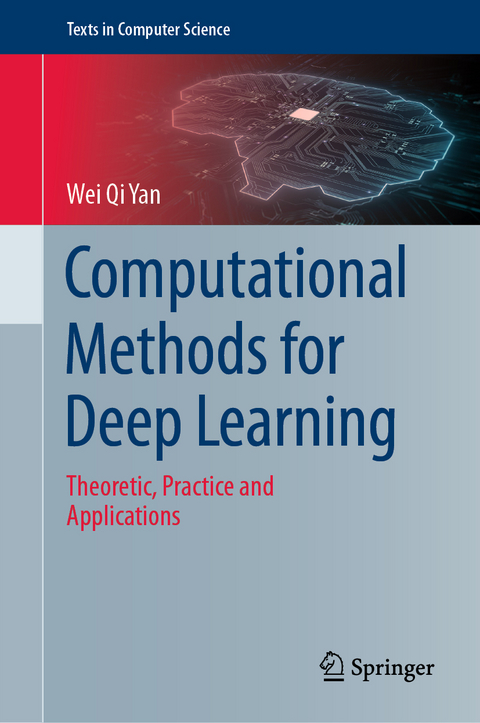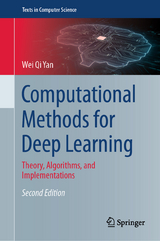
Computational Methods for Deep Learning
Springer International Publishing (Verlag)
978-3-030-61080-7 (ISBN)
Integrating concepts from deep learning, machine learning, and artificial neural networks, this highly unique textbook presents content progressively from easy to more complex, orienting its content about knowledge transfer from the viewpoint of machine intelligence. It adopts the methodology from graphical theory, mathematical models, and algorithmic implementation, as well as covers datasets preparation, programming, results analysis and evaluations.
Beginning with a grounding about artificial neural networks with neurons and the activation functions, the work then explains the mechanism of deep learning using advanced mathematics. In particular, it emphasizes how to use TensorFlow and the latest MATLAB deep-learning toolboxes for implementing deep learning algorithms.
As a prerequisite, readers should have a solid understanding especially of mathematical analysis, linear algebra, numerical analysis, optimizations, differential geometry, manifold, and information theory, as well as basic algebra, functional analysis, and graphical models. This computational knowledge will assist in comprehending the subject matter not only of this text/reference, but also in relevant deep learning journal articles and conference papers.
This textbook/guide is aimed at Computer Science research students and engineers, as well as scientists interested in deep learning for theoretic research and analysis. More generally, this book is also helpful for those researchers who are interested in machine intelligence, pattern analysis, natural language processing, and machine vision.
Dr. Wei Qi Yan is an Associate Professor in the Department of Computer Science at Auckland University of Technology, New Zealand. His other publications include the Springer title, Visual Cryptography for Image Processing and Security.
Dr Wei Qi Yan received a doctorate degree of computer engineering from the Chinese Academy of Sciences, Beijing, China in 2001, he moved to the School of Computing (SoC), National University of Singapore (NUS: Top 10, Worldwide) and worked as a Research Fellow, later as a regular faculty member from 2003-2005. In 2005, he joined the Columbia University in New York City, USA (Columbia: Top 10, USA) as a research scholar. He moved to the Department of Information and Computer Science, University of California, Irvine USA (UCI: Top 30, USA) in 2006. He joined the Department of Computer Science, Queen's University Belfast (Russell Group UK) as a Lecturer in 2007 and moved to the School of Computer and Mathematical Sciences, Auckland University of Technology (AUT), New Zealand in 2011 as an Associate Professor, the Director of Computer and Cyber Security (CCS) Research Group and the Deputy Director of CeRV research centresince 2015, the Director from 2019. Dr Yan has contributed to 13 granted research proposals, the amount of his research funds at AUT reaches to more than half million. He co-authored 13 research books as well as over 230 publications (J: 80+) with more than 2700 citations (Google i10-index: 55), one of his research papers has been cited over 700 times. His publications have been accepted or appeared in the ACM and IEEE journals and conferences. Dr Yan's research distinctions at AUT include Intelligent Surveillance, Currency Security, Visual Cryptography, Digital Event Computing, Intelligent Navigations, Deep Learning, etc. Dr Yan is a regular reviewer of PhD theses of AUT, the Massey University, the University of Canterbury, the University of Auckland (UoA), New Zealand, the National University of Singapore (NUS), and Nanyang Technological University (NTU), Singapore. Dr Yan's services have included being a TPC member of all the top ACM and IEEE conferences in his research area, Track Chair of ICME 2020, Publication Chair of ACPR 2019, Program Chair of IEEE AVSS 2018, General Chair of ISGV2020, IWDW 2013, Program Chair of WSVS 2015 and IWDCF 2015/2016/2017. Dr Yan has delivered over 100 talks around world, his visit to the Chinese Academy of Sciences China was sponsored by the Royal Society of New Zealand (RSNZ), Ministry of Science and Technology (MOST) China in 2013. He is an Adjunct Professor of the SKLOIS, Chinese Academy of Sciences, China with PhD supervision. Dr Yan also was a visiting Professor of the Department of Computer Science, University of Auckland (UoA) and National University of Singapore (NUS). Dr Yan is serving as the editor-in-chief (EiC) of the International Journal Digital Crime Forensics (IJDCF) from 2014 to 2019, a guest editor of the Springer Transactions on Data Hiding and Multimedia Security (DHMS), a book reviewer of John Wiley and Sons, IGI global, a proposal reviewer of Ministry of Business, Innovation, and Employment (MBIE) of New Zealand. He is also a member of the ACM, the chair of ACM New Zealand chapter in Multimedia, a senior member of the IEEE, TC members of the IEEE and a Fellow of the Higher Education Academy (FHEA), UK.
1. Introduction.- 2. Deep Learning Platforms.- 3. CNN and RNN.- 4. Autoencoder and GAN.- 5. Reinforcement Learning.- 6. CapsNet and Manifold Learning.- 7. Boltzmann Machines.- 8. Transfer Learning and Ensemble Learning.
"This book is a good resource with rather extensive pointers to the current literature on this important and growing area." (S. Lakshmivarahan, Computing Reviews, April 23, 2021)
| Erscheinungsdatum | 05.01.2021 |
|---|---|
| Reihe/Serie | Texts in Computer Science |
| Zusatzinfo | XVII, 134 p. 23 illus., 22 illus. in color. |
| Verlagsort | Cham |
| Sprache | englisch |
| Maße | 155 x 235 mm |
| Gewicht | 401 g |
| Themenwelt | Informatik ► Grafik / Design ► Digitale Bildverarbeitung |
| Informatik ► Theorie / Studium ► Künstliche Intelligenz / Robotik | |
| Schlagworte | autoencoder • Basic algebra • Calculus • Deep learning • Functional Analysis • generative adversarial networks • Graphical Models • Information Theory • linear algebra • machine learning • Machine vision • manifold learning • Natural Language Processing • Numerical analysis • Optimization • Pattern Analysis • Reinforcement Learning • Tensor Algebra • Time-series analysis • transfer learning |
| ISBN-10 | 3-030-61080-2 / 3030610802 |
| ISBN-13 | 978-3-030-61080-7 / 9783030610807 |
| Zustand | Neuware |
| Informationen gemäß Produktsicherheitsverordnung (GPSR) | |
| Haben Sie eine Frage zum Produkt? |
aus dem Bereich



